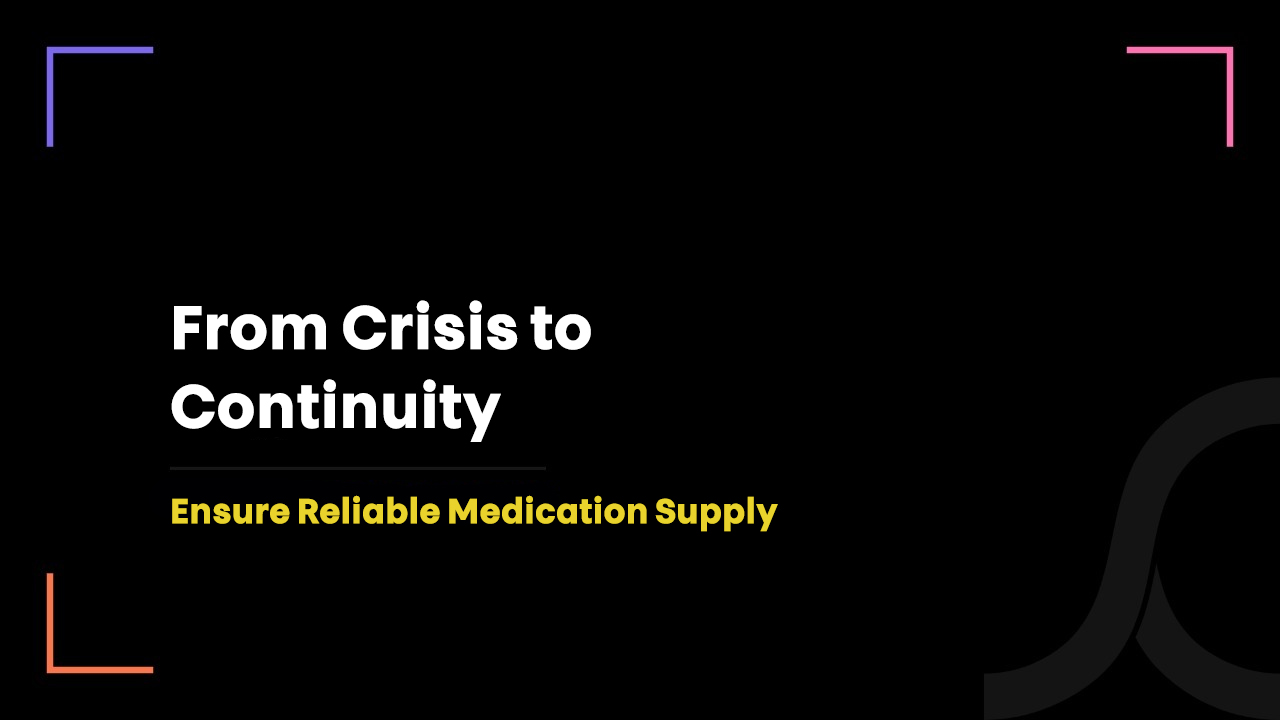Build Resilient Pharmacy Supply Chains: Ensure Access to Life-Saving Medications

9 months ago
The pharmaceutical industry plays a critical role in providing life-saving medications to patients worldwide.
However, events like the COVID-19 pandemic have exposed vulnerabilities in pharmaceutical supply chains.
To address these challenges, pharmaceutical companies must focus on building resilient supply chains that can withstand disruptions and ensure the availability of essential medicines.
The Current Landscape of the Pharmaceutical Market
The value of traded pharmaceutical goods has increased almost four folds from $390 billion in 2001 to $1.48 trillion in 2022.
The pharmaceutical market plays a key role in how people get medications and the payment for them.
27% of drug shortages happened due to supply chain issues in 2021.
The pharmaceutical industry witnessed significant disruptions, including delays and difficulties in obtaining raw materials and active pharmaceutical ingredients (APIs).
As pharmaceutical supply chains fall under the expectations and pressure of the pandemic, drug shortages have skyrocketed over the past couple of years.
In fact, according to a study by McKinsey, 90% of pharma companies have experienced at least one supply chain disruption in the past year.
- 70% of pharmaceutical companies experienced disruptions during the COVID-19 pandemic
- 83% of companies encountered delays or disruptions in their raw material supply during the pandemic
- 60% of companies reported difficulty in obtaining APIs (active pharmaceutical ingredients) due to disruptions in transportation and regulatory restrictions
- 78% of surveyed pharmaceutical executives believed that increasing supply chain resilience is a strategic priority for their organizations
The Challenges Faced by the Pharmaceutical Supply Chain

1. Regional Dependency
40% if the pharmacy trade occurs from a single region.
Hence, pharmacies are dependent on a single producer.
For example, 86% of the streptomycin produced in Chine is found in North America.
This dependency on one region can prove to be disastrous for pharma companies and public health when encountering a critical event.
2. Regulations Complexity
The pharmaceutical industry is regulated by the FDA in the US.
Though these regulations place additional requirements on the pharmacy companies, they are essential to identify counterfeit drugs.
The FDA has further added to the regulatory complexity of the industry by introducing supply chain regulations.
3. Tracking Shipment Condition
The Track and Trace Law by the FDA has made it mandatory to track shipment conditions.
Especially when the shipment needs to be kept in a specific temperature range.
4. Transportation Management
As there is a high demand for the drugs, the rates of the limited supply carriers have escalated.
The cancellations and frequent delays add extra pressure to the pharma companies.
4 Key Strategies to Make Your Pharmacy Supply Chain More Resilient

1. Establishing End-to-End Visibility
To build a resilient supply chain, pharmaceutical companies must have full visibility into the end-to-end process.
This includes mapping out all the components, processes, and stakeholders involved.
By leveraging technologies like blockchain, IoT sensors, and real-time analytics, companies can monitor and track their products at every stage, enabling early detection of potential disruptions.
2. Diversifying the Supplier Base
Overreliance on a single supplier or geographic region can make supply chains vulnerable.
Pharma companies should diversify their suppliers by engaging multiple suppliers for critical components or ingredients.
Spreading sourcing across different regions reduces the risk of disruptions caused by localized events like natural disasters, political instability, or regulatory changes.
3. Building Agile Manufacturing Networks
Integrating agility into manufacturing processes is crucial for maintaining a resilient supply chain.
Pharma companies should explore strategies such as
- Distributed manufacturing networks
- Local production capabilities
- Flexible manufacturing technologies
Decentralizing manufacturing and adopting flexible production systems enable quick adaptation to changes in demand, respond to supply disruptions, and ensure continuity of supply.
4. Collaboration and Risk Sharing
Collaboration and risk-sharing among stakeholders are crucial to building supply chain resilience.
Pharma companies should actively engage with suppliers, logistics partners, regulatory authorities, and even competitors to establish robust collaborative relationships.
Sharing information, insights, and best practices can help
- Identify potential risks
- Develop contingency plans
- Collectively respond to disruptions
Technological Advancements to Strengthen Your Pharmaceutical Supply Chain
The pharmaceutical industry has been leveraging innovative solutions to enhance supply chain resilience.
One notable solution to tackle these pharmacy supply chain challenges is our pharmacy supply chain management software.
With this solution, you will be able to manage your pharmacy inventory, orders, suppliers, and partners.
Yes! From a single platform.
Let us enlist some of the features of our pharmacy supply chain management software.
- Automated refill order reminders
- Automated refills
- Automated prescription renewal reminders
- Integration with the PBMS and international partner software
- Automated order placement in the international partner software
- Automated updates of the tracking details
- Limited medication visibility
- Automated emails and notification alerts from your pharmacy
- Order sets for specific requirements
- Reports of the saved costs
- No limitation on the number of partner pharmacies
- Customizable discount rates for each partner pharmacy
And the best part is,
You can get it customized as per your pharmacy needs.
Why Should You Choose Our Software Solution?
We’re a Canadian-based health tech company.
We have been at the forefront of technological innovation in the healthcare domain for over 8 years.
With our expertise in software development and data analytics, we have been instrumental in supporting pharmaceutical companies in their journey toward resilient supply chains.
